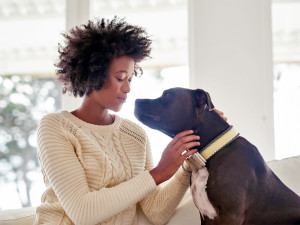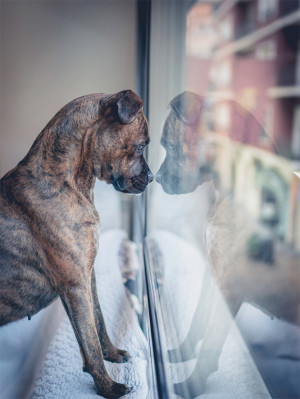Why Does Your Dog Stare at the Wall?
Do they see something you can’t, or what?

Share Article
In This Article:
Is My Dog Bored? Why Does My Dog Stare At The Wall? Does My Dog Hear or See Something?
Any dog parent can attest to their pup engaging in behavior that can best be described as…just plain weird. Whether it’s barking at nothing, fixating on another dog, or staring at the wall, dogs often exhibit behaviors that seem oddopens in new tab to their human parents. Often, these behaviors are normal or have some clear reason behind them, if you can just sort it out. But in some cases, unusual behavior from your dog can be a sign of an underlying issue.
If your dog persists in staring at a blank wall, it could be a symptom of a medical issue, like confusion or senility in older dogs or a seizure disorder. Or your dog could have developed this behavior over time and just can’t seem to stop.
“Dogs may stare at walls for several reasons,” dog behavior expert and trainer Shelby Semel opens in new tab says. “It could be a sign of cognitive dysfunction syndrome (CDS), particularly in senior dogs, as they may feel disoriented or confused. Alternatively, they might hear or smell something inside the wall—dogs’ senses are far more acute than ours. In some cases, wall-staring might indicate a neurological condition like a seizure or a compulsive behavior. If you notice this behavior frequently, it's worth documenting when it happens and consulting your veterinarian to rule out any serious underlying issues.”

Is my dog bored?
How do I know if my dog is bored? It’s always a possibility that your dog is simply bored, especially if they don’t have much to do during the day. Make sure your dog has plenty of physical and mental stimulation, like interactive toys, to keep them busy when you’re away. Otherwise, they may resort to behavior like staring at the wall simply to pass the time.
“Bored dogs often ‘make their own fun,’ which might look like chewing on furniture, excessive digging, or tipping over trash cans,” Semel says. “You might also notice behaviors like restlessness, excessive barking, or constantly seeking your attention. Sometimes, boredom is confused with separation anxiety, so it’s helpful to observe when the behavior occurs and under what circumstances. To combat boredom, consider mental enrichment activities like puzzle toys, scavenger hunts, or training sessions.”
Why does my dog stare at the wall?
My dog sits and stares at the wall. Are they OK?
There are a number of reasons why a dog may spend time staring at the wall, from behavior issues to medical concerns. And unfortunately, some of them are definitely cause for worry.
Cognitive dysfunction syndrome (CDS)opens in new tab in dogs is similar to Alzheimer’s in humans. Just like us, when dogs grow older, they may grow more senileopens in new tab and struggle to remember learned behaviors, like potty training. Dog dementia presents in different ways, so if you suspect your dog has declined cognitive function, visit your vet for a diagnosis. They can help manage symptoms by prescribing medications, as well as recommend strategies to help you deal with changes in your senior dog’s behavior.
We tend to think of seizures (in both dogs and humans) as dramatic, but often they present with quieter symptomsopens in new tab, like staring at a wall. This sort of behavior could be the result of a partial or focal seizureopens in new tab, which are harder to diagnose. While seizures in dogs can be a result of cancer or epilepsy, in many cases, they can be managed with medication.
On the less frightening end of the spectrum, your dog could simply stare at a wall as an attention-seeking behavior. Think about whether you’ve regularly given your dog attention when they stare at a wall. For example, if you have a dog camera that dispenses treats mounted on the wall, your dog may simply be looking for a snack.
Staring could also be a compulsive behavioropens in new tab. Just like compulsive disorders in humans, dogs can engage in behaviors that don’t result in attention or reward, like spinning, tail biting, chewing, or barking. Any compulsive behavior can grow worse over time, so make sure to mention it to your vet.
Does my dog hear or see something?
It’s no secret that dogs have way better hearingopens in new tab than humans, and some aspects of their sight are better too, although not color visionopens in new tab. Dogs see limited colors and most easily perceive yellow and blue, which lessens the chances that they’ll notice something out of the ordinary by sight.
Your dog may be picking up on a noise that you simply can’t hear, like insects or other critters scurrying inside the walls of your house. Pay attention to your dog’s body language and look for signs of anxiety, like holding their ears back, as well as their facial expressions.
Instead of lamenting to yourself, Well, my dog just stares at the wall, sit down next to your dog and listen quietly. You may even want to press your own ear against the wall and see if you can detect any noise. If you suspect there may be some sort of infestation, contact an exterminator to investigate.
What about ghosts? Can dogs perceive the paranormal? While some pet parents believe that animals are more sensitive to unseen spirits, there’s no evidence to back this idea up. So, instead of worrying about hauntings, contact your vet if you’re concerned about your dog’s unusual staring behavior.
When to seek expert help
If you catch your dog staring at the wall, don’t panic! This behavior doesn’t necessarily mean that your dog has a severe condition like a seizure disorder or cancer. Monitor the behavior, and if you notice your dog staring at walls more often or other changes in behavior, contact your vet to get their opinion. In most cases, this behavior is the result of a treatable health condition, but it’s still important to take the symptom seriously, for your pet’s sake and your own peace of mind.
“While an occasional glance at the wall might be harmless curiosity, consistent or prolonged wall-staring should prompt closer observation,” Semel says. “It can sometimes indicate serious medical issues, including seizures or cognitive decline. If your dog seems otherwise healthy, you might first investigate potential environmental triggers like pests in the walls. However, if the behavior persists or is accompanied by other signs, consulting your vet is the safest course of action.”
References
“Cognitive Dysfunction Syndrome (CDS) | Indoor Pet Initiative.” 2019, indoorpet.osu.edu/dogs/aging_pets/cdsopens in new tab.
“Dr. P’s Dog Training: Canine Vision.” www4.uwsp.edu/psych/dog/LA/DrP4.htmopens in new tab. Accessed 14 Jan. 2025.
“Frequency Hearing Ranges in Dogs and Other Species.” 2017, www.lsu.edu/deafness/HearingRange.htmlopens in new tab.
Henton, Lesley. “Recognizing Compulsive Disorders in Dogs and Cats.” Texas A&M Today, 6 July 2023, today.tamu.edu/2023/07/06/recognizing-compulsive-disorders-in-dogs-and-catsopens in new tab.
“If You Have an Older Pet, Be on the Lookout for Signs of Cognitive Decline.” Veterinary Teaching Hospital, 6 Sept. 2023, vetmedbiosci.colostate.edu/vth/animal-health/if-you-have-an-older-pet-be-on-the-lookout-for-signs-of-cognitive-decline/opens in new tab.
“Managing Seizures.” Cornell University College of Veterinary Medicine, 1 Sept. 2022, www.vet.cornell.edu/departments-centers-and-institutes/riney-canine-health-center/canine-health-information/managing-seizuresopens in new tab.
Salustri, David. “K-9 Behaviors | What Your Dog’s Behaviors Mean | K-9 Mysteries.” Community Care College, 24 Feb. 2023, communitycarecollege.edu/veterinary-assistant/pet-behavior/k-9-behaviorsopens in new tab.
“Understanding the Complexity of Seizures.” VMBS News, 18. Jan. 2024, vetmed.tamu.edu/news/pet-talk/pet-seizuresopens in new tab.

Savannah Admire
Savannah Admire is a writer and pet mom to two dogs and a cat. Under the name Savannah Cooper, she has published poetry in 40 different publications, as well as a poetry book, Mother Viper (2025). When she’s not writing, you can find her reading, taking photos, or volunteering as a content creator for her local community theatre. As a pets writer, she focuses on cat and dog behavior and pet parenthood. She currently lives in Western Maryland.
Related articles
Can Dogs See Ghosts?
This isn’t The Sixth Sense, but dogs are powerfully perceptive.
![Dog Looking Out The Window.]()
Dog Vision: What Do Dogs See?
Those soulful eyes mean everything to you—learn all about them.
Can Dogs See in the Dark? Does My Dog Have Night Vision?
Hopefully, they at least fare better than we do when the lights go out.
![a dog walking with their parent at night]()
Why Do Dogs’ Eyes Glow in the Dark?
The reason for your midnight jump-scare? Turns out it’s just your dog’s spooky eyes.
![close up of Chihuahua dog's eye with cataracts]()
Common Eye Problems in Dogs and How to Treat Them
Your dog sees you as their best friend, so keep those eyes healthy.
![Reflection of a multi-colored rainbow on the face of a mixed breed dog sitting on the floor indoors]()
What Colors Can Dogs See? How Dog Vision Really Works
Let’s put a stop to this “dogs are totally color blind” myth.







